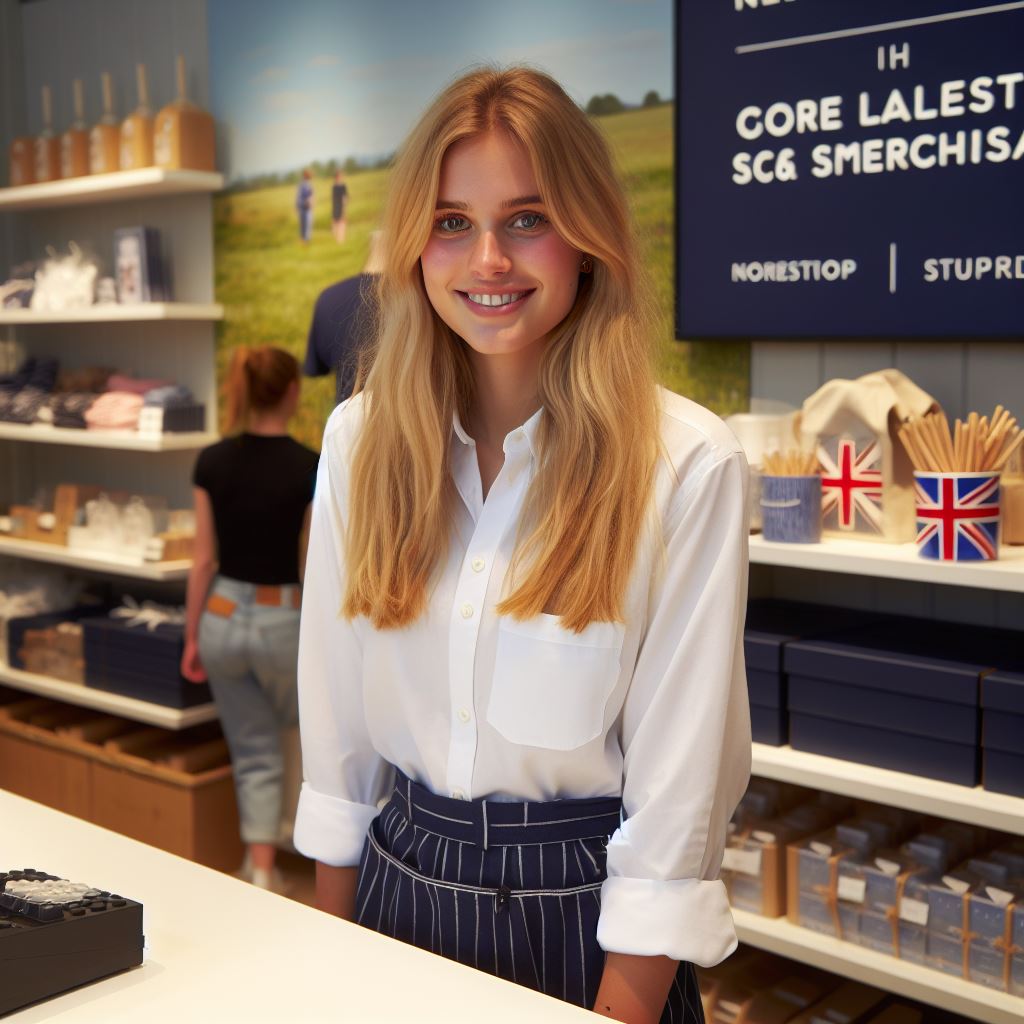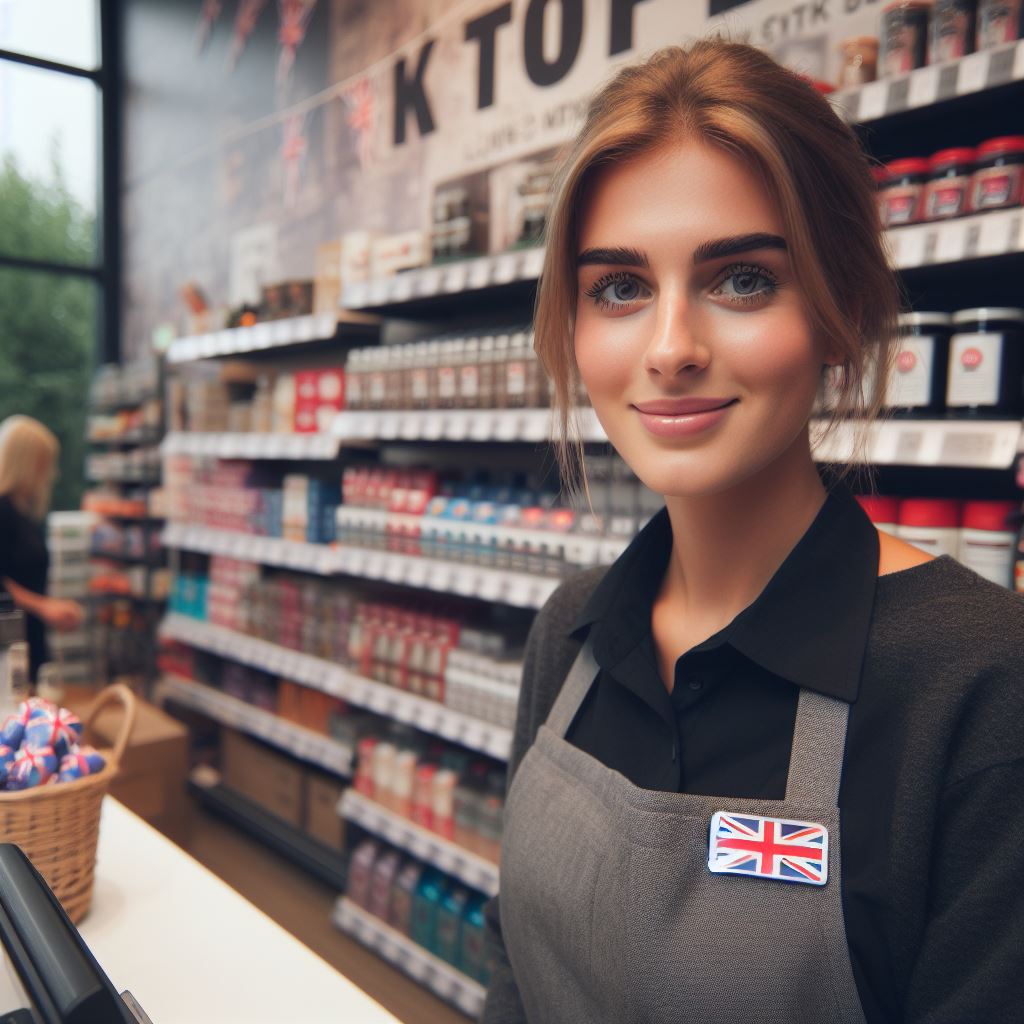Introduction
Fashion merchandising in the UK is a dynamic and crucial profession that plays a significant role in the country’s fashion industry.
With its vibrant and diverse fashion scene, fashion merchandising is essential for driving sales, enhancing brand visibility, and meeting consumer demands.
In the vibrant realm of fashion, where style converges with commerce, the landscape of Fashion Merchandising in the United Kingdom unfolds as a captivating narrative.
A fusion of creativity and business acumen, this dynamic discipline not only dictates the trends that grace runways but also orchestrates the intricate dance between consumer desires and retail strategies.
Against the backdrop of iconic fashion capitals and a rich cultural tapestry, Fashion Merchandising in the UK emerges as a sophisticated interplay of market dynamics, trend forecasting, and the seamless integration of cutting-edge technologies.
As we embark on a journey through the intricacies of this field, we delve into the artistry of visual presentation, the precision of inventory management, and the strategic prowess required to navigate the ever-evolving landscape of the fashion industry on British soil.
Join us in unraveling the threads of Fashion Merchandising in the UK, where style meets strategy, and innovation weaves the fabric of the future.
Definition of Fashion Merchandising
Fashion merchandising is a dynamic field that combines fashion and business.
It involves the buying, presentation, and promotion of fashion products. Fashion merchandisers are responsible for analyzing market trends and consumer behavior to determine which fashion products will be successful.
They play a crucial role in ensuring that the right products are available in stores at the right time.
Here, we will explore the definition of fashion merchandising in the UK and discuss the various aspects and responsibilities involved in this profession.
What fashion merchandising entails
Fashion merchandising refers to the process of planning, buying, and selling fashion products in a way that attracts and satisfies customers.
It involves understanding customer preferences, predicting fashion trends, and making informed business decisions.
The various aspects and responsibilities involved in the profession
1. Buying and Planning
Fashion merchandisers are responsible for selecting the right mix of fashion products to be sold in stores.
They analyze sales data, market research, and fashion trends to identify the products that will appeal to customers.
Personalized UK Career Consulting
Receive tailored career guidance designed just for you. Get actionable steps and expert support to boost your career in 1-3 days. Take control of your career now.
Get StartedThey also negotiate with suppliers and manage inventory levels to ensure that the right products are available at the right time.
2. Visual Merchandising and Store Presentation
One of the key responsibilities of fashion merchandisers is to create visually appealing displays in stores.
They use their creative skills to showcase fashion products in an enticing manner.
This involves arranging products, creating window displays, and using lighting and props to enhance the overall shopping experience.
3. Marketing and Promotion
Fashion merchandisers collaborate with marketing teams to develop effective strategies to promote fashion products.
They participate in fashion shows, events, and exhibitions to create brand awareness and attract customers.
They also utilize digital marketing platforms, such as social media, to engage with customers and drive sales.
4. Trend Forecasting and Analysis
Fashion merchandisers must stay updated with the latest fashion trends and consumer preferences.
They conduct market research, analyze customer data, and collaborate with designers and fashion forecasters to predict future trends.
This helps them make informed decisions on which fashion products to stock and promote.
5. Retail Analytics and Sales Analysis
Fashion merchandisers analyze sales data and retail analytics to evaluate the performance of fashion products.
They assess factors such as sales volume, inventory turnover, and profit margins to identify opportunities for improvement.
This data-driven approach helps them make data-informed decisions to drive sales and maximize profitability.
6. Product Development and Sourcing
Fashion merchandisers work closely with designers and suppliers to develop new fashion products.
Your Dream Job Starts with a Perfect CV
Get a tailored CV and cover letter that captures your unique strengths and stands out in your industry. Let us help you make an unforgettable first impression.
Get StartedThey collaborate on product design, fabric selection, and pricing strategies.
They also engage in sourcing activities to find the best suppliers and manufacturers to ensure quality and cost-effectiveness.
7. Merchandising Strategies and Range Planning
Fashion merchandisers develop merchandising strategies and range plans to guide the assortment of fashion products.
They analyze sales data, market trends, and customer demographics to determine which product categories and styles to focus on.
This helps them create a well-balanced and profitable range of fashion products.
In short, fashion merchandising in the UK involves a combination of creativity, business acumen, and strategic decision-making.
Fashion merchandisers play a crucial role in the success of fashion retail businesses by ensuring that the right products are available in stores at the right time.
They are responsible for buying, planning, visual merchandising, marketing, trend forecasting, retail analytics, product development, and range planning.
Fashion merchandising is an exciting and challenging profession that requires a deep understanding of the fashion industry and consumer behavior.
Read: Merchandising Tools & Technology
Education and Training
When it comes to pursuing a career in fashion merchandising in the UK, there are specific educational requirements and qualifications that one should consider.
These requirements and qualifications play a vital role in shaping a successful career in the field.
Let’s explore some of the key aspects in detail:
Educational Requirements and Qualifications
- A minimum of a high school diploma or equivalent is usually required to start a career in fashion merchandising.
- Many professionals in this field opt for higher education to enhance their knowledge and skills.
- Having a bachelor’s degree in fashion merchandising, fashion management, or a related field is highly beneficial.
- Some employers even prefer candidates with a master’s degree in fashion merchandising or a relevant discipline.
- Individuals who possess a strong background in business management and marketing can also excel in this field.
Degree Programs and Courses
The UK offers a range of degree programs and courses that cater to the needs of aspiring fashion merchandisers.
Optimize Your LinkedIn for Success
Boost your LinkedIn profile with a professional bio, keyword-rich headline, and strategic recommendations that attract recruiters. Stand out from the crowd and get noticed.
Optimize NowThese programs provide students with the necessary knowledge and skills required to excel in the industry.
Here are some notable options:
- Bachelor’s Degree in Fashion Merchandising: This program focuses on various aspects of fashion merchandising, including retail management, buying and merchandising, trend analysis, and consumer behavior.
- Bachelor’s Degree in Fashion Management: This program combines both business management and fashion-related courses, offering a broader understanding of the industry.
- Master’s Degree in Fashion Merchandising: This advanced program targets individuals who want to gain an in-depth understanding of the field and enhance their leadership and management skills.
- Short Courses and Workshops: There are also several short-term courses and workshops available that provide specific skills and knowledge to professionals who are already working in the industry.
Gaining Practical Experience
While education plays a crucial role, gaining practical experience through internships or apprenticeships is equally important in fashion merchandising.
Internships provide hands-on experience and an opportunity to apply theoretical knowledge in real-world situations.
Here’s why practical experience is essential:
- Practical experience helps individuals develop a better understanding of the industry and its dynamics.
- It allows students to observe and learn from professionals, giving them valuable insights into the practical aspects of merchandising.
- Internships and apprenticeships also provide an opportunity to build professional networks and establish connections within the industry.
- Employers often prioritize candidates with practical experience, as it demonstrates their readiness for the job.
- Practical experience can enhance problem-solving skills and foster creativity, allowing individuals to excel in their careers.
In fact, a career in fashion merchandising in the UK requires a combination of education and practical experience.
Obtaining the necessary qualifications, such as a degree in fashion merchandising, and gaining hands-on experience through internships or apprenticeships, can pave the way for a successful and fulfilling career in this dynamic industry.
Read: Success Stories: UK Merchandisers
Job Opportunities
The different job opportunities within the field of fashion merchandising in the UK
In the field of fashion merchandising, there are various job opportunities available in the United Kingdom.
This section will explore the different roles and responsibilities of fashion merchandisers and highlight the sectors and industries they can work in.
1. Roles and Responsibilities
- Fashion Merchandisers are responsible for planning and selecting products to be sold in stores.
- They analyze market trends and customer preferences to make informed buying decisions.
- Fashion Merchandisers also negotiate contracts and prices with suppliers and vendors.
- They collaborate with design and marketing teams to ensure product visibility and promotional strategies.
- They monitor inventory levels and sales performance, making adjustments to optimize profitability.
- Additionally, Fashion Merchandisers stay updated on industry developments and competitor activities.
2. Sectors and Industries
Fashion Merchandisers can work in various sectors and industries, offering a wide range of career opportunities.
Retail
- Retail companies, such as department stores, boutiques, and specialty retailers, hire fashion merchandisers.
- They are responsible for creating appealing displays, analyzing sales data, and managing inventory.
- Some fashion merchandisers may specialize in specific product categories, like apparel, accessories, or footwear.
Fashion Brands
- Fashion brands often have in-house merchandising teams that work closely with designers and buyers.
- These merchandisers ensure brand consistency, identify emerging trends, and coordinate product launches.
- They collaborate with marketing and PR teams to promote the brand and its products.
E-commerce
- The rise of online shopping has created numerous job opportunities for fashion merchandisers.
- E-commerce platforms require merchandisers to optimize product listings, categorize items, and enhance user experience.
- Merchandisers in this sector also analyze online sales data and implement strategies to drive online growth.
Wholesale
- Fashion merchandisers can work for wholesale companies that supply products to retailers.
- They collaborate with buyers and sales teams to identify market demands and develop product assortments.
- In wholesale, merchandisers often attend trade shows and fashion events to source new products.
Visual Merchandising
- Visual merchandisers focus on creating visually appealing displays that drive customer engagement.
- They work for retail stores, fashion brands, and e-commerce platforms, enhancing the overall shopping experience.
- These merchandisers have a keen eye for design and visual aesthetics.
In essence, the field of fashion merchandising in the UK offers a wide range of job opportunities.
Fashion merchandisers play vital roles in various sectors and industries, including retail, fashion brands, e-commerce, wholesale, and visual merchandising.
Their responsibilities encompass analyzing market trends, managing inventory, coordinating with different teams, and driving sales.
As the fashion industry continues to evolve, the demand for skilled fashion merchandisers remains high.
Read: Merchandising: Freelance vs. In-House

Skills and Qualities
Fashion merchandising is a highly competitive industry that requires a unique set of skills and qualities in order to succeed.
The essential skills and qualities needed to succeed in fashion merchandising
Here are some of the essential traits that a fashion merchandiser should possess:
1. Analytical and Problem-solving Skills
- To excel in fashion merchandising, one must have strong analytical skills to understand consumer behavior and market trends.
- Effective problem-solving skills are vital to tackle challenges like inventory management and forecasting demand.
- Being able to analyze data and make informed decisions is crucial for success in this field.
2. Creativity and a Strong Sense of Fashion Trends
- A fashion merchandiser should have a creative flair to curate visually appealing displays and product assortments.
- Having a keen eye for fashion trends enables them to anticipate customer preferences and stay ahead of the curve.
- Keeping up with the latest fashion shows, magazines, and influencers helps in developing a strong sense of style.
3. Excellent Communication and Interpersonal Skills
- Strong verbal and written communication skills are essential for effective collaboration with designers, buyers, and retailers.
- Being able to articulate ideas and persuade others is crucial for negotiating and selling fashion merchandise.
- Interpersonal skills help in building and maintaining relationships with suppliers and industry professionals.
4. Attention to Detail and Organizational Skills
- Having meticulous attention to detail ensures that merchandise is presented in a visually appealing and cohesive manner.
- Organizational skills are necessary to manage inventory, coordinate deliveries, and keep track of various fashion collections.
- Fashion merchandisers often work on multiple projects simultaneously, and being organized is crucial for meeting deadlines.
5. Business Acumen and Financial Skills
- An understanding of business principles and financial skills is necessary to manage budgets, pricing strategies, and profit margins.
- Fashion merchandisers need to make strategic decisions to maximize sales while considering cost-effective measures.
- Being able to analyze market trends and forecast future demands helps in making informed business decisions.
Importance of Having Strong Analytical and Problem-solving Skills
In fashion merchandising, having strong analytical and problem-solving skills is paramount for success.
The industry is constantly evolving, and staying ahead of trends requires the ability to analyze data, identify patterns, and make strategic decisions.
Fashion merchandisers need to evaluate market trends, consumer preferences, and sales data to determine which products will sell well and at what price point.
Additionally, they must be able to solve complex problems related to inventory management, supply chain logistics, and customer demands.
By utilizing strong analytical and problem-solving skills, fashion merchandisers can optimize sales, reduce costs, and make informed business decisions that drive profitability.
Need for Creativity and a Strong Sense of Fashion Trends
Creativity and a keen sense of fashion trends are essential for fashion merchandisers.
Creating visually appealing displays and curating product assortments that resonate with customers’ tastes requires a creative mindset.
By staying abreast of fashion shows, magazines, and influencers, fashion merchandisers can anticipate and capitalize on emerging trends.
This enables them to select the right mix of products that align with current styles and customer preferences.
Additionally, creativity plays a significant role in marketing and promoting fashion merchandise to capture the attention of customers.
By infusing innovation and imagination into their work, fashion merchandisers can differentiate their brands and drive customer engagement.
In general, succeeding in fashion merchandising requires a combination of essential skills and qualities.
Analytical and problem-solving skills are crucial for making informed business decisions and tackling challenges in the industry.
Creativity and a strong sense of fashion trends help fashion merchandisers curate visually appealing displays and stay ahead of consumer preferences.
Excellent communication, attention to detail, organizational skills, business acumen, and financial skills are also essential to thrive in this competitive field.
By possessing these traits, fashion merchandisers can effectively navigate the dynamic world of fashion and contribute to the success of their brands.
Read: Digital Impact on UK Merchandising
Salary and Career Progression
An insight into the salary range of fashion merchandisers in the UK
When it comes to fashion merchandising in the UK, the salary range for professionals in this field can vary significantly.
Starting salaries for fashion merchandisers typically range from £18,000 to £25,000 per year.
However, as you gain experience and develop your skills, your earning potential can increase substantially.
Experienced fashion merchandisers can earn anywhere between £30,000 and £45,000 per year.
The possibility of working up to management or executive positions
Moreover, those who reach management or executive positions within the industry can earn even higher salaries, sometimes exceeding £60,000 per year.
It is worth noting that the salary range will also depend on factors such as the size and type of the company you work for, your level of responsibility, and your location within the UK.
The potential for career progression and advancement within the profession
In terms of career progression, the fashion merchandising profession offers numerous opportunities for advancement.
As you gain experience and prove your skills, you can move up the ladder within the industry.
Many fashion merchandisers start as assistant merchandisers or junior merchandisers, working closely with senior professionals to learn the ropes and develop their expertise.
With time and demonstrated competence, you can progress to become a senior merchandiser, taking on more responsibility and overseeing larger portions of the merchandising process.
From there, you may have the chance to move into management roles, such as merchandising manager or merchandising director.
These positions involve supervising teams, setting strategies, and making key business decisions.
For those with an entrepreneurial spirit, there is also the possibility of starting your own fashion merchandising business or consultancy firm.
It is important to note that career progression in fashion merchandising is not solely based on years of experience, but also on your ability to showcase your skills, creativity, and strategic thinking.
Building a strong network, staying up-to-date with industry trends, and continuously improving your knowledge through courses or certifications can enhance your career prospects.
In a nutshell, fashion merchandising in the UK offers a wide salary range, starting from £18,000 and potentially exceeding £60,000 per year for management or executive positions.
The profession also provides ample opportunities for career progression, allowing individuals to work their way up from entry-level roles to senior merchandisers or even venture into entrepreneurship.
To succeed in this field, it is crucial to continually develop your skills, stay current with industry trends, and showcase your abilities to advance your career.
Learn More: A Day in the Life of a UK Retail Manager
Challenges and Future Trends
The challenges faced by fashion merchandisers in the UK, such as fast-changing fashion trends and consumer demands
In the fast-paced world of fashion, merchandisers in the UK face a multitude of challenges.
From constantly changing fashion trends to evolving consumer demands, staying ahead of the game is no easy task.
The first major challenge for fashion merchandisers is keeping up with the ever-changing fashion trends.
Each season brings new styles, colors, and patterns that must be incorporated into the product assortment.
This requires close collaboration with designers and buyers to ensure that the right products are being developed and ordered.
Another challenge faced by fashion merchandisers is meeting consumer demands.
With the rise of e-commerce and social media, consumers have become more knowledgeable and demanding.
They expect a seamless shopping experience both online and offline, including quick delivery and easy returns.
Merchandisers must constantly analyze consumer data to understand their preferences and cater to their needs.
Additionally, the fashion industry is increasingly focused on sustainability.
Consumers are becoming more conscious of the environmental impact of their fashion choices and are demanding sustainable and ethically-produced products.
Fashion merchandisers need to source environmentally-friendly materials and work with suppliers who adhere to ethical practices.
Technology plays a crucial role in the future of fashion merchandising.
With the rise of automation, artificial intelligence, and machine learning, merchandisers can analyze massive amounts of data to predict consumer preferences and optimize inventory levels.
This helps reduce waste and improve profitability.
The future trends and advancements in the field, such as the impact of technology and sustainability in fashion merchandising
Online presence is also a key future trend in fashion merchandising.
Social media platforms such as Instagram and TikTok have become powerful marketing tools for brands to engage with consumers and showcase their products.
Fashion merchandisers need to have a strong online presence and use social media to connect with consumers and drive sales.
Another future trend in fashion merchandising is personalized shopping experiences.
Brands are leveraging data analytics to offer personalized product recommendations and exclusive offers based on consumers’ preferences and shopping behavior.
This creates a unique and tailored experience that can enhance customer loyalty.
Furthermore, fashion merchandisers are also exploring new retail formats and collaborations to attract and engage consumers.
Pop-up stores, collaborations with influencers, and limited-edition collections are just some of the ways that brands are creating excitement and exclusivity.
In summary, fashion merchandisers in the UK face numerous challenges, including fast-changing fashion trends and evolving consumer demands.
However, with advancements in technology and a focus on sustainability, there are exciting opportunities for growth and innovation in the field.
By embracing these future trends and constantly adapting to the ever-changing fashion landscape, merchandisers can stay ahead and ensure success in the dynamic world of fashion.
Conclusion
Fashion merchandising plays a crucial role in the UK’s fashion industry.
It is responsible for creating visually appealing retail environments, attracting customers, and driving sales.
By bringing together the creative and business aspects of fashion, fashion merchandising ensures the success of fashion brands and retailers.
Through this blog post, we have discussed key points such as the definition of fashion merchandising, its various components, and the skills required to excel in this field.
We have also explored the importance of staying updated with the latest fashion trends and consumer behavior.
Fashion merchandising is highly relevant in the UK’s fashion industry, as it supports the growth and profitability of businesses.
It allows fashion brands to effectively showcase their products, communicate their brand identity, and connect with their target audience.
If you have a passion for both fashion and business, pursuing a career in fashion merchandising can offer exciting opportunities.
It allows you to work closely with designers, buyers, marketers, and retailers to create engaging and visually impactful fashion experiences for consumers.
Whether you aspire to become a visual merchandiser, brand manager, or retail buyer, the field of fashion merchandising offers a diverse range of career paths.
It allows you to blend your creative and analytical skills and contribute to the vibrant and ever-evolving world of fashion.
So, if you’re looking for a dynamic industry that combines your love for fashion and business, consider exploring the field of fashion merchandising.
The possibilities are endless, and the rewards are both personally fulfilling and professionally satisfying.
Start your journey today and be a part of the exciting world of fashion merchandising in the UK.




